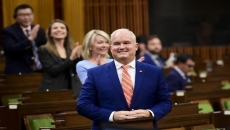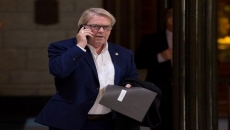A border officer denies that he led Huawei executive Meng Wanzhou to believe that she was required to share the passcodes to her phones when he asked for them before her arrest two years ago.
The B.C. Supreme Court is hearing evidence this week that Meng's defence team hopes will bolster an argument they will make next year during extradition proceedings that she was subject to an abuse of process.
The defence alleges that Meng was subjected to a "co-ordinated strategy" to have the RCMP delay her arrest so border officials could question Meng under the pretence of a routine immigration exam, and that both RCMP and Canada Border Services Agency officials kept intentionally poor notes.
Scott Kirkland, a border services officer, is the second witness testifying in the evidentiary hearing and he says he wrote down Meng's phone numbers and passcodes because she was uncomfortable with her own handwriting.
He says Meng asked why he needed them and he told her it was for the purposes of the customs and immigration examination at Vancouver's airport.
He says he asked for the passwords to her other devices but she declined.
"I did not say she had no choice," Kirkland said under cross-examination by defence lawyer Mona Duckett.
"I explained why we were asking for them."
Kirkland says the phones remained in an anti-static bag in his pocket and were never examined by border officials while Meng was in the secondary screening room.
Seven minutes after the phone numbers and passcodes were recorded, Meng was escorted into another room where RCMP officers arrested her and informed her of her charter rights to silence and counsel.
Kirkland was not leading the immigration screening and says that while he was asked to collect her phone numbers, he can't recall if he was asked to collect her passcodes or made the decision himself.
He has said it's typical to search phones and devices during a customs and immigrations examinations when there is a suspicion of inadmissibility to Canada, and he assumed the border agency would search Meng's devices.
Meng is wanted in the United States on fraud charges over allegations she lied to HSBC about Huawei's relationship with a company doing business in Iran, putting the bank at risk of violating American sanctions against that country.
Meng and Huawei deny the allegations.
Next year, her defence team will try to prove she was subject to an abuse of process in three different areas. They allege that her questioning and arrest at the airport was unlawful, that she has been used as a "bargaining chip" by U.S. President Donald Trump in relations with China, and that the United States misled Canadian officials in its summary of allegations against her.






